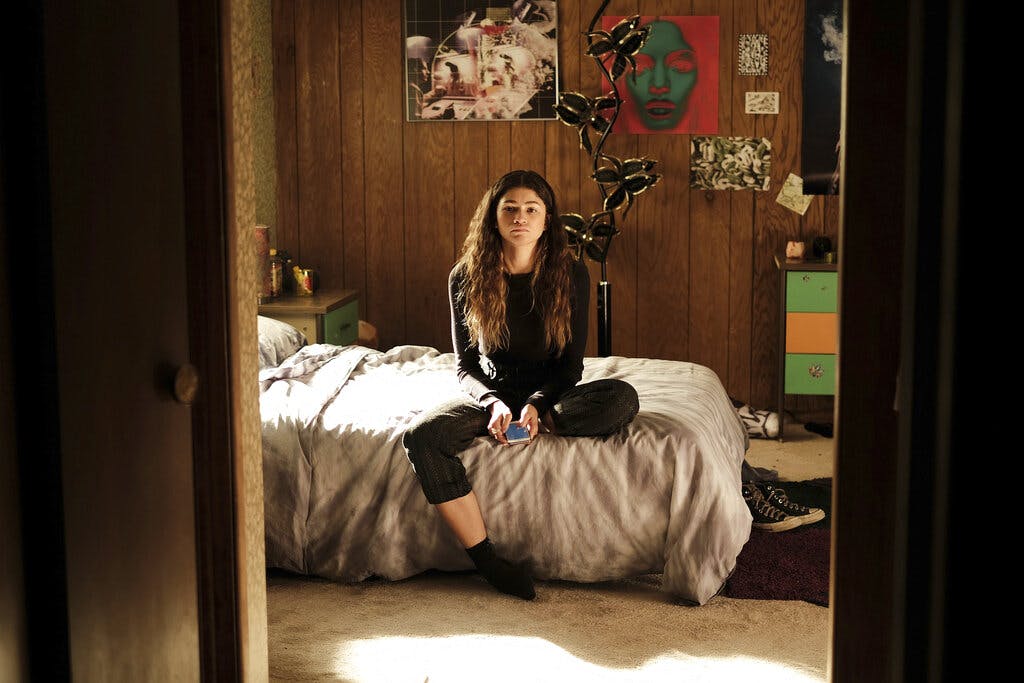Weekend Essay: To Become Your Most Mature Adult Self, Watch Teen TV
When we’re watching teen drama unfold in TV and movies, charming us with its deliciously dramatic and idealistic pitch, are we restoring parts of ourselves, even if only for a moment?

My obsession started with “Felicity,” “Gilmore Girls,” and “The OC,” but living as an adult in my third decade of life hasn’t prevented me from devouring the more recently released close cousins of my favorite childhood shows, things like “Outer Banks,” “Euphoria,” “Never Have I Ever,” and “The Summer I Turned Pretty.”
Interestingly, as both anecdotal evidence and analytics indicate, I’m not alone.
The creator of HBO’s “Euphoria,” Sam Levinson, said the show is “intended for teenagers of 17 years old or older,” yet its millions of viewers seem to span several decades, and it has been dubbed an ATFA show, i.e., a program “about teens, for adults.”
What’s more, even many shows that are indeed said to be made for only teens seem to be drawing sizable adult audiences. While age representation on IMDB’s ratings-by-demographic might just be an indicator of which age groups are more likely to take to the internet to share their opinions about such programs, when it comes to shows like “Outer Banks,” “The Summer I Turned Pretty,” and “Never Have I Ever,” critics between the ages of 30 and 44 routinely weigh in more often than the 18- to 29-year-olds.
Often, I joke that, because I will always be 19 in my heart, teen TV belongs to me. Yet, lately, I’ve begun to wonder what’s transpiring, in a deeper and more psychologically informed sense, such that so many adults cozy up to binge both old and new shows about adolescence. Is it boredom and escapism? Idealism? Denial? Timelessness? Or, perhaps, nostalgia?
Weighing in on the subject, respondents to my social media poll said things like, it’s “a break from reality and [I’m] addicted to feeling young again”; “the romance makes me feel alive”; “nostalgia is comforting”; and, “it just … makes things simpler … I don’t want to see people going to work and dealing with taxes and death … it’s lighter. It’s easier to digest.”
Perhaps I experience an amalgam of these sentiments while watching things like “To All the Boys I’ve Loved Before,” but, more than anything else, it’s an exquisite and exquisitely painful internal tug that’s at work for me. It feels, somehow, like both a push and pull — the desire to return to and go in search of feelings of aliveness, characteristic of teen firsts, but that I’m certain must be found and fed throughout our lives. It’s nostalgia, and as the Greek root of that word implies, it certainly produces that special sort of acute and aching homesickness, but it also fuels my faith in whatever magic the future must hold.
There’s something else in it, too. In adulthood, we diverge, each on her own path. We leave high school hallways and hangouts wherein we were moving through the seasons at equal pace, fulfilling the same requirements, and passing the same life milestones, for the highly individualized tracks of adulthood. Yet, because experiences are blunted by familiarity — because we’re jaded — instead of delving deeply into our romantic pain and pleasure, we offer rough sketches of our unique love stories and traumas to quickly bring new friends and partners up to date on our baggage.
When I watch my teen soaps, I remember that elusive combination of singularity and community. The details of my heartbreaks were the world’s newest and most important information — wholly unlike anything anyone else had ever known — yet, I experienced them right alongside my similarly anguished friends. A vitalizing harmony of “I” and “We.” A simultaneous faith in one’s supremely special story and a welcome repose in the arms of the collective.
I wonder, though, is it only desire and fantasy that I’m experiencing? Is it merely yearning for what once was and what may one day be? Or is it something real and more tangible that’s activated and born as I reach for my 19-year-old self?
In a 2017 New Yorker piece, “The True Meaning of Nostalgia,” Michael Chabon writes: “The nostalgia that I write about, that I study, that I feel, is the ache that arises from the consciousness of lost connection…. Nostalgia, to me, is not the emotion that follows a longing for something you lost, or for something you never had to begin with, or that never really existed at all…. It’s the feeling that overcomes you when some minor vanished beauty of the world is momentarily restored…. In that moment, you are connected; you have placed a phone call directly into the past and heard an answering voice.”
I wonder, then, when we’re watching teen drama unfold in TV and movies, charming us with its deliciously dramatic and idealistic pitch, are we restoring parts of ourselves, even if only for a moment? Are we, in fact, not reaching in futility for something we’ll never again have but awakening dormant nerve endings? And, if we are, indeed, bringing sleeping selves into the present for a short while, what does that achieve?
Well, perhaps it yields a more integrated and more realized self.
We know that there’s a danger in pining for the past — that it’s problematic or depressing to speak of one’s bygone glory days or deem college “the best time of one’s life.” We know, as well, that there’s something unfortunate about the fact that, while those so-called glory days are happening, we lack the perspective to appreciate them. As George Bernard Shaw once wrote, “Youth is wasted on the young.”
So what if, by regularly invoking nostalgia as Mr. Chabon understands it — by visiting and stirring our fiery younger selves — we momentarily connect to and restore our sense of aliveness, idealism, and romance, but do so with the hard-won wisdom of adulthood? What if, magically, we are layering ourselves upon our own selves, acquainting the childhood hearts we miss with the battle-scarred minds of which we’re deeply proud? What if we allow the different versions of us to be each other’s teachers so that, as we progress through the years, we are, eventually, able to notice and revel in life’s most beautiful, raw, and enchanting moments while they’re happening?
A close friend of mine, a therapist by trade, likes to joke about my suffering from “clinical nostalgia,” a whimsical term of his invention. And, it’s true: I love and often pine for my roots and daydream of the past. Lately, though, I’ve begun to wonder if I might reframe this seemingly unhealthy behavior as a way of staying awake to my essential self.
Like so many of us, my teenage self burned with a sense of mission and certainty that, still today, feels like home. She had nerve and conviction. And, while the noise and traffic of adult life, replete with responsibilities and anxieties, makes it hard to hear my most spirited inner self, she’s there. Always was. And, strangely enough, Netflix helps me find her again.

